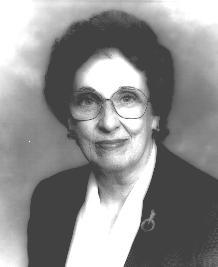Page 144
[Begin Tape 1, Side A]
Shanahan: Before we get started today, I wanted to say something about my friend Isabelle Shelton of the Washington Star who died two weeks ago. And I want to say it because I hope that some researchers of the future who read or listen to this oral history will be directed towards hers, which tragically was hardly begun when she died. It only took her up to 1960. I really feel the loss for women's history.
Clark: Absolutely.
Shanahan: The reason I wanted to mention Isabelle is that she and a few like her were very important people in the history of journalism. Isabelle spent the bulk of her career at the Washington Star in the women's section. It was my great pleasure to cover a lot of the early women's movement stuff with her. But I'm talking about an earlier time. She went with the Star in the late forties, early fifties, I forget. And women's sections in those days were women's sections. They had to be all for and about women.
And Isabelle usually, like women of that era in journalism, covered president's wives, interviewed the wife of the president, the wife of the Cabinet member, the senators' wives, but she did it differentlyónot froth but substance. And many of these women, of course, were very bright and knew a heck of a lot. But they were relegated, almost literally, to tea parties and certain kinds of charitable work which in fact is not to be sneered at. But she reached for the opportunity to get substance into the section and found that the Star would in fact let her write about anything she wanted to for its women's pages as long as it was about a woman or women.
I remember in particular her interviews with newly arrived ambassadors' wives. Often they told me more about the politics and history and traditions of their countries than I've learned in all the years since. Even in those early days, she searched for and found and wrote about that handful of women who were really important in their own right. And she constantly extended the concept of what she was there at the Star to doóand did it and some others followed. But I think for a decade or more, she was really the only person on the paper in Washingtonóthere were some elsewhere who were in this project, like the woman, Vivian Castleberry in Dallas who did some of the same sorts of things in quite a different setting.
But I'm struck by the fact that women like me, who were the first to cover beats like economic policy or science or sports are called and honored as "pioneers." But the truth is all I did was prove that a woman could do the job of covering economics. I didn't change the way it was done, at least not until many years later when the women's movement awakened me to the possibilities. Isabelle was a pioneer of an earlier time, of a different kindóI would argue a more significant time. For most of her career, she worked in an arena of journalism that was the exclusive province of women and she changed its agenda.
Ben Bradlee of the Washington Post is, of course, given the credit for inventing the style section which is now a standard element of newspapers across the country. But I believe that he would notócould not have thought of it if it hadn't been for the work of Isabelle and some few women of her generation who paved the way. Isabelle demonstrated just by going out and doing it what important, serious journalism could be achieved

